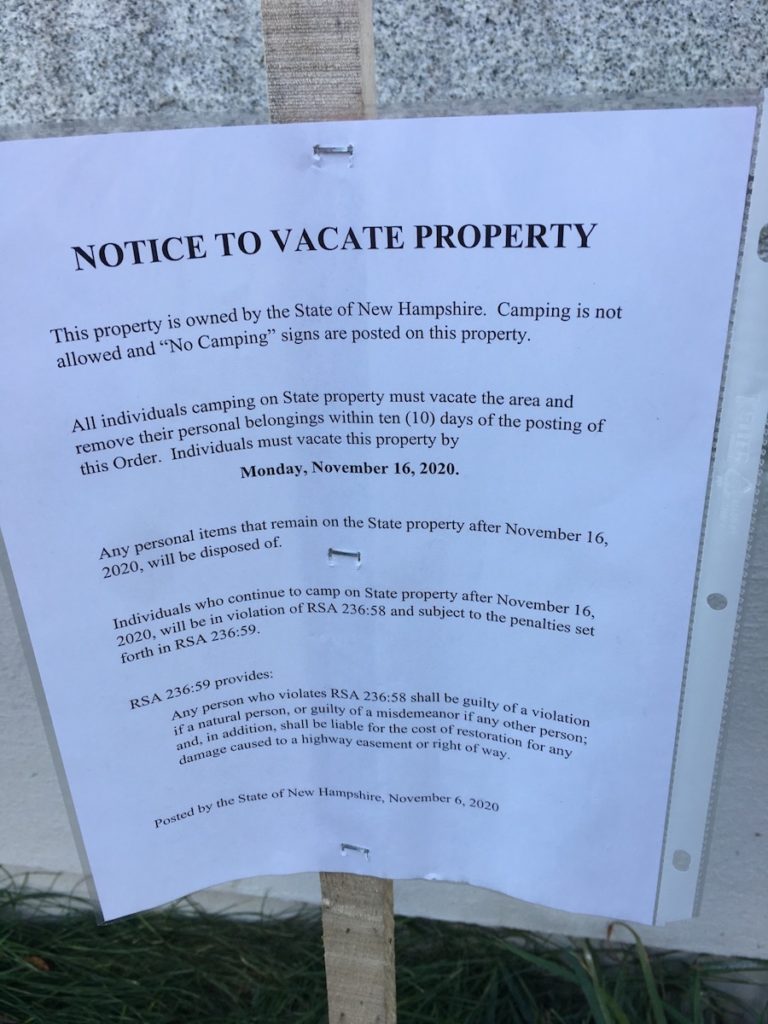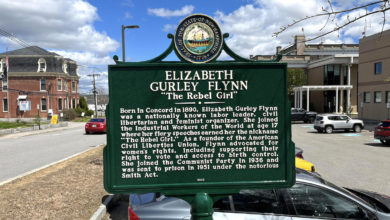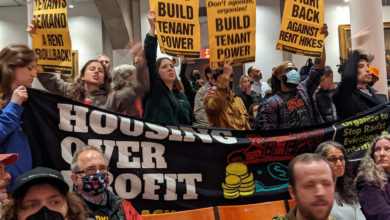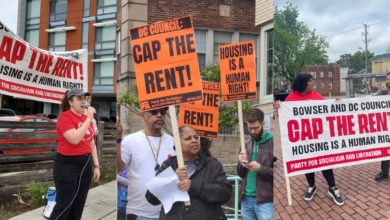A “No Camping” sign, installed next to a tent city in Manchester, New Hampshire, has been amended by the people living there. Liberation Photo: Claire Alexandria
Following months of volleying indecision between New Hampshire Governor Chris Sununu and Manchester Mayor Joyce Craig, the governor has ordered the destruction of a tent city at the Hillsborough County Superior Court, established by the city’s homeless community.
This decision contradicts CDC COVID-19 guidelines directing officials to “allow people who are living unsheltered or in encampments to remain where they are.”
The eviction notice reads, “Any personal items that remain on the State property after November 16, 2020, will be disposed of. Individuals who continue to camp on State property after November 16, 2020, will be in violation of RSA 236:58 and subject to the penalties set forth in RSA 236:58” which include a misdemeanor charge and possible fines.
In September, the state of New Hampshire had posted “no camping” signs and removed park benches in an attempt to displace the individuals living there — yet the camping continued. Craig said herself in a public statement issued Oct. 20: “The State cannot move individuals from state-owned land unless they can identify a specific bed for each individual.” Liberation News staff was told by another camp resident that there are even fewer beds available at homeless shelters than before, and a two month long waiting list.

On November 8, two days after the notice to vacate was posted, Craig said, “There is an increase in homelessness. We need to take a different look at what we’re doing. There is not enough housing to address this.” Within walking distance of the encampment, two new hotels were opened in downtown Manchester this year. The new Residences Inn by Marriott, only two blocks away, has 123 rooms, and the new Hilton hotel half a mile away, has 126 rooms. This highlights the contradiction of capitalism: private corporations have the right to hold empty rooms, but the people have no right to housing.
“I used to work for pretty much all the charities around here, before I became homeless.” Dennis, who wished to only be identified by first name, told Liberation News, “Back in the day, the federal people said we weren’t allowed to camp here, we had to go wherever we could: train tracks, under the bridge, in little hideaway places by the railroads, and the cops would come and slash the tents with razor blades so people couldn’t use them . . . [the police] were here last night, going through, just trying to scare people.
“A lot of people here are very secretive because of whatever reason, a lot of people here, they’re scared of cops, they’re scared of anybody in authority, they’ve been beaten down their whole lives. There’s a whole lot of trauma built into this place . . . the cops, you know didn’t see us as human. The hospitals are really bad too. We’re scared to go to [Catholic Medical Center] because they mess with us in really sick ways.”
While Craig desperately tries to detach herself from any responsibility and Sununu prepares to forcefully remove the people living at Hillsborough County Court, the threat of winter looms. In October, Craig asked the state for $250,000 in funding, and Sununu said no.
In an interview published Nov. 9, Craig said, “We have requested from the state to utilize the armory, to date they have said no, but we are asking again respectfully.” This publicizes that not only will she do nothing to help the 365 people spread out amongst 32 camps in the city, she is deferring to someone who has shown nothing but disdain for the city’s houseless population.
New Hampshire, like many states, is experiencing a housing crisis. As of 2019, the average two bedroom apartment requires a $53,900 per year salary, which is 129 percent of the state average. Between 55,000 and 90,000 people are at risk of losing their homes in the wake of COVID-19.
Instead of evicting the homeless community that has formed outside the courthouse, the city and state governments could easily choose to help these residents. The Armory could be used as temporary housing. Government funds could be allocated to house people in the new hotels at no loss to Marriott’s or Hilton’s bottom line.
There are solutions that honor the human dignity of the 365 known houseless people in Manchester, but capitalism “produces homelessness within a landscape of excess housing, that keeps the ownership of housing and other fundamental necessities in the private hands of the few” and neither Manchester, nor the state of New Hampshire seem ready to violate that principle of capitalism in order to help those in need.





